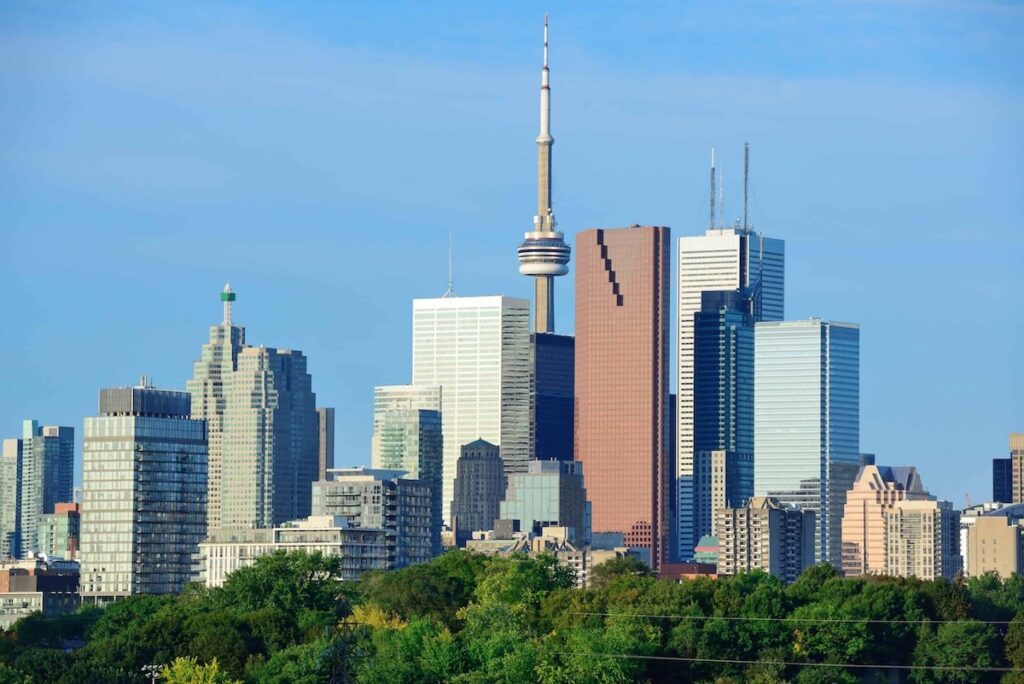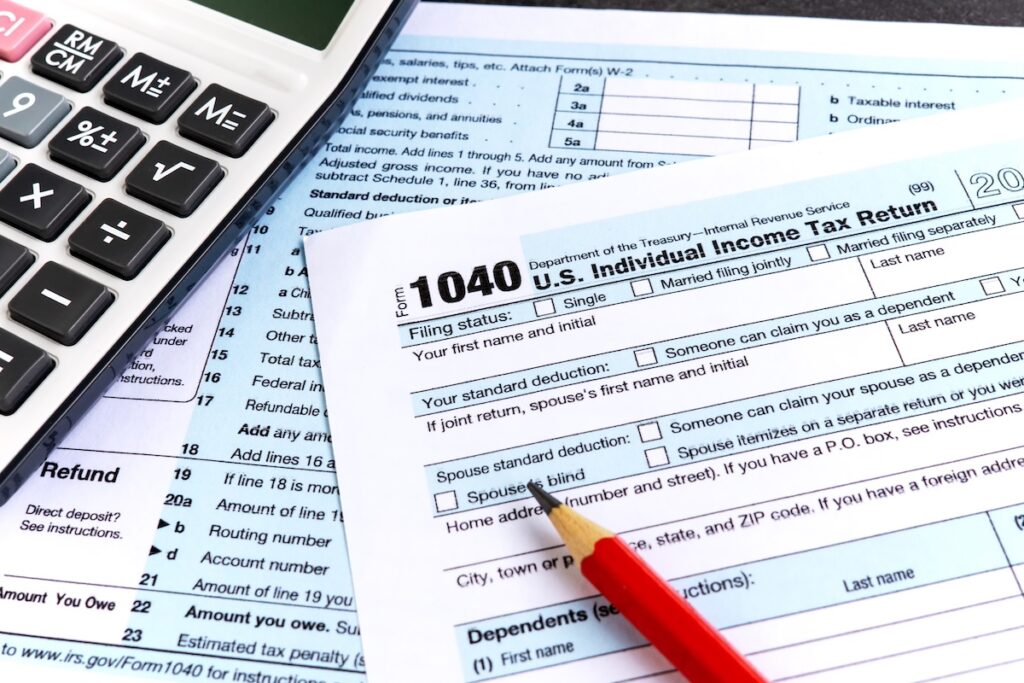Moving to Canada from the US in 2025
July 31, 2025 | Country Guides | 10 minute read
Expat Tax Blog. Tax Tips for US Americans abroad.
Updated October 16, 2025
 All blogs are verified by Enrolled Agents and CPAs
All blogs are verified by Enrolled Agents and CPAs
Updated October 16, 2025

Canada is a top destination for Americans planning a move abroad in 2025, and our neighbor to the north is only becoming more appealing. Known for its universal health care, a progressive outlook, clean cities, and friendly reputation, it’s easy to see why.
Following the 2024 election, ongoing political division, rising healthcare costs, and economic uncertainty are pushing more Americans to look north. Searches for how to move to Canada have surged since the start of 2025, reflecting growing interest in a fresh start across the border.
Yet 2025 has been a complex year. US-Canada tariff tensions have driven up the cost of living and fuelled political tensions, making strategic planning more important than ever.
However, proximity doesn’t mean hopping across the border is a cakewalk. While Canada may feel familiar and close, its immigration process is far from simple.
In this article, we explain what to expect and whether moving to Canada from the US is the right decision for you.
Rising US–Canada trade tensions have introduced new tariffs, quietly driving up the cost of goods across the border.
For Americans relocating, that means higher prices on everything from groceries to household essentials and even potential moving costs.
Moving to Canada from the US: Requirements
Moving to Canada may seem simple; shared language, cultural overlap, and a friendly border often give that impression. However, becoming a legal resident involves more than crossing the border with a suitcase. Every American must go through Canada’s official immigration process, handled by Immigration, Refugees and Citizenship Canada (IRCC)
To qualify, you’ll need to apply through one of several immigration pathways:
- Express Entry – For skilled workers, points-based and competitive
- Work or Study Permit – Requires a job offer or school enrollment
- Spousal or Family Sponsorship – If you have a Canadian partner or immediate family
Eligibility doesn’t guarantee approval, and Canada’s system is competitive and points-based. Dual citizenship is allowed, so US citizens don’t have to give up their passport, but Green Card holders should know that extended stays abroad could risk their US status. Knowing what to expect upfront, from documentation to legal steps, is essential for a smooth transition.
Even a single DUI on your record can make you inadmissible to Canada. You may need to apply for criminal rehabilitation or a temporary resident permit to be allowed entry.
What Is the Process for Moving to Canada from the US?
Canada offers several immigration pathways for Americans, but choosing the right one depends on your background, goals, and eligibility. You should also be ready with documentation, proof of funds, and, in many cases, a competitive application.
Here are the most common routes:
Express Entry
Canada’s flagship program for skilled workers. It uses a points-based system based on age, education, work experience, and language ability. It’s fast, competitive, and ideal for professionals in high-demand fields such as healthcare and social services, STEM (science, technology, engineering, and math), trades, education, and agriculture.
Provincial Nominee Program (PNP)
Each province manages its own immigration needs. Provinces like Nova Scotia, British Columbia, and Alberta can nominate candidates who have skills in high demand. If you know where you want to live or have skills matching local labor shortages, a PNP can be a more direct path to permanent residency.
Work Permit
If you land a job offer from a Canadian employer, you can apply for a temporary work permit. In some cases, this can lead to permanent residency through employer sponsorship or Express Entry eligibility.
Study Permit + Post-Graduation Work Permit (PGWP)
Studying in Canada (at a recognized institution) gives you access to a study visa. After graduation, you may qualify for a PGWP, a valuable bridge to full-time work and eventually permanent residency.
Family Sponsorship
If your spouse, common-law partner, or parent is a Canadian citizen or permanent resident, they may be able to sponsor your application. This path tends to be more personal but still requires complete documentation and approval.
Start-Up Visa
Entrepreneurs with a scalable business idea and backing from a designated Canadian investor may qualify for the Start-Up Visa. This is a niche but powerful option for founders, especially in tech and innovation sectors.
Each immigration stream has its own requirements, timelines, and paperwork. Start by considering your current skills, job opportunities, or family ties in Canada.
Not sure where to begin? A licensed Canadian immigration attorney or consultant can help you avoid costly mistakes and guide you toward the right program.
What to Know Before Moving to Canada from the US
Before making the move, it’s important to understand how daily life in Canada differs from what you may be used to in the US.
The transition comes with benefits and adjustments, from healthcare access to living expenses.
Healthcare Access and Private Insurance
Healthcare is one of Canada’s biggest draws, but new arrivals should be prepared. Most provinces have a waiting period of up to three months before public coverage kicks in. You’ll need private or travel insurance to cover basic medical needs during that time.
Once enrolled, provincial plans cover essentials like doctor visits, hospital stays, and diagnostics, but they don’t include everything. Dental, vision, mental health services, and prescription drugs often require additional private coverage.
While Canada’s healthcare system offers peace of mind, it’s not without trade-offs.
Wait times for non-urgent procedures can be longer than many Americans are used to, especially in major cities.
Canada’s healthcare system covers essentials like doctor visits and hospital stays, but it doesn’t include everything. You’ll likely need private insurance for extras such as dental care, vision, and prescription medications.
Cost of Living and Taxes in Canada
Moving to Canada won’t always save you money. Living costs vary by city and province, and urban centers like Toronto and Vancouver are comparable or more expensive than top US cities.
Here’s how expenses typically break down:
- Rent: Living costs are highest in cities like Toronto and Vancouver, while Montreal tends to be more affordable. Mid-sized and rural areas are generally even more budget-friendly
- Groceries: Generally more expensive, especially with 2025 tariffs increasing food costs
- Transportation: Good public transit in cities, but car ownership costs more, especially insurance
- Education: Public universities are more affordable than in the US, and private K-12 schools often cost less
If you plan to purchase a home, be aware that the Canadian housing market, especially in major cities, can be significantly more expensive. High demand and limited supply often mean you’ll get less space for more money compared to similar markets in the US.
You’ll also face higher taxes, with sales taxes reaching 13–15% and income taxes layered federally and provincially.
That said, if you earn US dollars or work remotely, your money can go further in smaller Canadian cities or towns. If you’re heading to a major urban center, expect higher costs, and be sure to plan your budget carefully, especially during your transition.
Lifestyle and Cultural Differences
Daily life in Canada may look familiar on the surface, but there are some key differences. Work culture tends to be more balanced, with extended paid parental leave, generous vacation time, and stronger labor protections. Canadians tend to prioritize time outdoors, whether it’s weekend hikes, lake trips, or making the most of long summer days at the cottage.
Social values tend to be collective rather than individual. Canadians generally value public healthcare, education, and government services highly. Political discourse is often less polarized than in the US, though this is not always the case in every region.
If you’re considering life in Quebec, keep in mind that French isn’t just cultural, it’s often mandatory. In cities like Montreal and Quebec City, language plays a central role in both daily life and employment.
Staying flexible and open and not expecting a carbon copy of the US will help you adjust and settle in faster.
US Taxes While Living in Canada
Moving to Canada doesn’t exempt you from your US tax obligations. If you’re a US citizen or Green Card holder, you must file a US tax return annually and report your worldwide income regardless of where you live.
Fortunately, most Americans can avoid double taxation thanks to the US–Canada tax treaty, along with other tax provisions designed to prevent being taxed twice on the same income. These include:
- Foreign Earned Income Exclusion (FEIE): You can exclude up to $130,000 in 2025 of foreign earned income if you meet residency or physical presence tests.
- Foreign Tax Credit (FTC): Offers a dollar-for-dollar credit for Canadian taxes paid, offsetting your US tax bill. The FTC is often more favorable, especially if you live in a high-tax country like Canada or have unearned income such as dividends or interest.
- Foreign Housing Exclusion: Allows you to deduct qualified housing expenses, such as a portion of rent, utilities above a set threshold, if you meet the Foreign Earned Income Exclusion (FEIE) requirements and live in a high-cost area like Toronto or Vancouver.
These tools, when applied correctly, can dramatically reduce or eliminate your US tax liability, but they don’t remove your filing obligation.
If you hold Canadian bank accounts, pensions, or investment portfolios, you’ll also face additional IRS reporting:
- FBAR (FinCEN 114): Required when the total combined maximum value of your foreign accounts, including bank accounts, investment accounts, and certain retirement plans, exceeds $10,000 at any time during the year.
- FATCA (Form 8938): May apply if your foreign assets cross certain thresholds, depending on your filing status.
US Retirement Accounts: What Happens in Canada?
If you have a 401(k), Traditional IRA, or Roth IRA, here’s what to expect once you become a Canadian tax resident:
- Traditional IRAs and 401(k)s are automatically recognized as pension plans under the treaty. This means Canada generally allows tax deferral on investment growth and won’t tax the income until you make withdrawals.
- Roth IRAs, on the other hand, are not tax-deferred or tax-free in Canada by default. Canada may tax annual growth and withdrawals unless you make a treaty election under paragraph 7 of Article XVIII (Election) and avoid contributing after your move. When the election is made, Canada generally respects the tax-free treatment of qualified withdrawals, just as the US does.
- New contributions to US retirement plans may be tax-deferred in the US, but the Canada Revenue Agency (CRA) does not generally provide tax benefits for these contributions.
- Withdrawals are taxed by both countries. The Canada–US tax treaty gives primary taxing rights to the US where the plan is based, while Canada typically provides a Foreign Tax Credit to avoid double taxation.The treaty also works in the other direction: it protects Canadian pensions and RRSPs from US taxation until you take withdrawals, preserving tax deferral for Canadian accounts held by US taxpayers.
However, not all accounts are covered. The treaty does not apply to Canadian tax-free savings accounts (TFSAs) or Registered Education Savings Plans (RESPs), so any growth in these accounts may be taxable by the US.
Avoid making new contributions to US retirement accounts while living in Canada, as they offer no Canadian tax break and can lead to double taxation. Consult a cross-border tax advisor before making changes.
Planning ahead is key when moving to Canada. MyExpatPlanning helps you time your move for the best tax outcome, understand how your US retirement accounts and investments will be treated, and structure your finances before establishing Canadian residency. With expert guidance, you can avoid costly mistakes and set yourself up for long-term success across both borders.
Is Moving from the US to Canada the Right Decision for You?
Relocating to Canada opens the door to meaningful benefits: universal healthcare, a strong social safety net, family-friendly policies, and a high standard of living. For many Americans, it’s a chance to live in a country prioritizing community, stability, and access to public services.
That said, it’s important to set realistic expectations. Before you take the leap, ask yourself:
- Are you ready for the process? Immigration isn’t instant. Canada’s system is structured, competitive, and takes time. Planning ahead and having backup options is key.
- Do your financial expectations match reality? Life in Canada offers value, but it’s not necessarily cheaper. Housing, food, and taxes can be higher than you’re used to, especially in major cities like Toronto and Vancouver.
- Are you open to cultural shifts? From politics to daily norms, Canada has its own identity. Embracing the differences will help you feel at home faster.
- Are you thinking long-term? Building a new life and possibly applying for citizenship takes time, ties to your new community, and a mindset focused on contribution. It isn’t a quick passport; you must be in for the long haul.
Canada offers plenty of reasons for Americans make the move, but it’s not always the right fit for everyone. Understanding your long-term goals and reasons for moving to Canada from the US will help you decide if the move aligns with your lifestyle, values, and financial priorities.
Make the Move North the Smart Way
Moving to Canada is a big step, but with smart planning and the right support, it doesn’t have to be overwhelming. Whether you’re still weighing your options or getting ready to apply, understanding the tax side of your move is just as important as visas and paperwork.
MyExpatTaxes has helped thousands of Americans transition smoothly to life in Canada. Helping them staying compliant, minimizing tax burdens, and avoiding expensive surprises.
Frequently Asked Questions
Content of the Accordion Panel
To move to Canada, US citizens must apply through an approved immigration pathway, such as Express Entry, a work or study permit, family sponsorship, or a provincial nominee program. Your eligibility will depend on factors like age, education, work experience, language ability, and family ties. The process is points-based, competitive, and requires advance planning.
Content of the Accordion Panel
Not necessarily. Some smaller cities and provinces offer a lower cost of living, but major cities like Toronto and Vancouver are among the most expensive in North America. Canada also has higher income and sales taxes, but stronger public benefits and safety nets.
Content of the Accordion Panel
Timelines vary by immigration stream. For example, Express Entry applications may be processed in six months or less, while family sponsorship or PNPs can take longer. Most Americans start as temporary residents and apply for permanent residency once they’ve met the necessary requirements.
Content of the Accordion Panel
Yes. Both countries allow dual citizenship, so you won’t need to give up your US passport when you become a Canadian citizen.
Content of the Accordion Panel
You must first obtain permanent residency (PR) and live in Canada for at least 3 years within a 5-year period. After that, you can apply for citizenship, pass a language test, take a citizenship exam, and complete the oath of citizenship ceremony.
Content of the Accordion Panel
Yes. US citizens must file a US tax return annually, regardless of where they live. Fortunately, the US–Canada tax treaty, along with provisions like the Foreign Earned Income Exclusion (FEIE) and Foreign Tax Credit (FTC), can help avoid double taxation. You may also have to file FBAR and FATCA forms for foreign accounts.
Content of the Accordion Panel
Not immediately. Most provinces impose a waiting period of up to three months before newcomers are eligible for public healthcare. During that time, you’ll need temporary private insurance. Even once covered, you may still need private plans for dental, vision, or prescriptions.
Content of the Accordion Panel
Canada’s process is welcoming but competitive. Programs like Express Entry use a points system based on age, education, experience, and language skills. You’ll also need documentation, background checks, and patience. Approval isn’t guaranteed—but with the right plan, it’s very achievable.
Content of the Accordion Panel
Top pathways include Express Entry, Provincial Nominee Programs (PNP), work or study permits, family sponsorship, and start-up visas. Each has its own requirements, process, and timeline.
Content of the Accordion Panel
Not necessarily. Some streams, like Express Entry or family sponsorship, don’t require a job offer. However, having one can strengthen your application and may qualify you for a work permit, which often leads to permanent residency. Other options, like study permits or entrepreneur visas, also don’t require a job offer upfront.
Content of the Accordion Panel
Healthcare in Canada is publicly funded, meaning essential medical services like doctor visits and hospital care are covered through taxes. However, it’s not entirely free—most provinces don’t cover dental, vision, prescriptions, or mental health services, so many residents use private insurance for those.
See Why US Expats From Around the World Love Us!
Easily file regardless of how complex your US expat tax situation is.
Been here before? Sign in!


Written by Nathalie Goldstein, EA
Nathalie Goldstein, EA is a leading expert on US taxes for Americans living abroad and CEO and Co-Founder of MyExpatTaxes. She contributes to Forbes and has been featured in Forbes, CNBC and Yahoo Finance discussing US expat tax.
July 31, 2025 | Country Guides | 10 minute read






